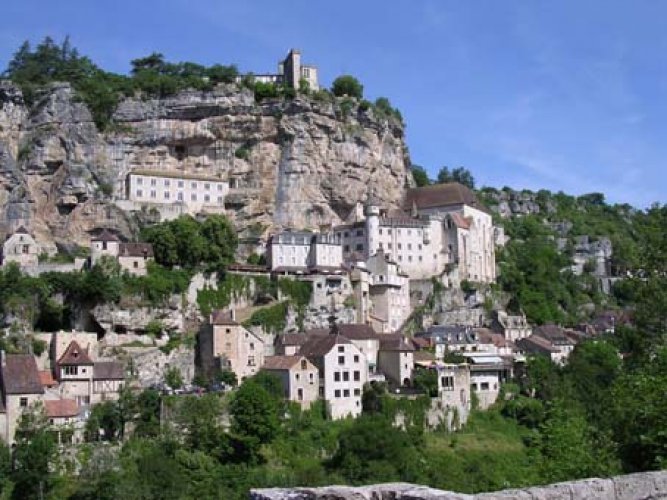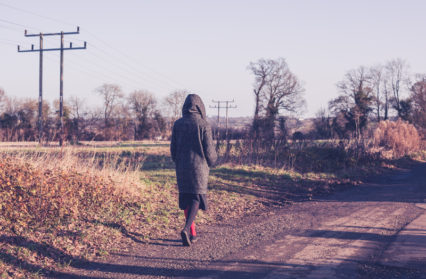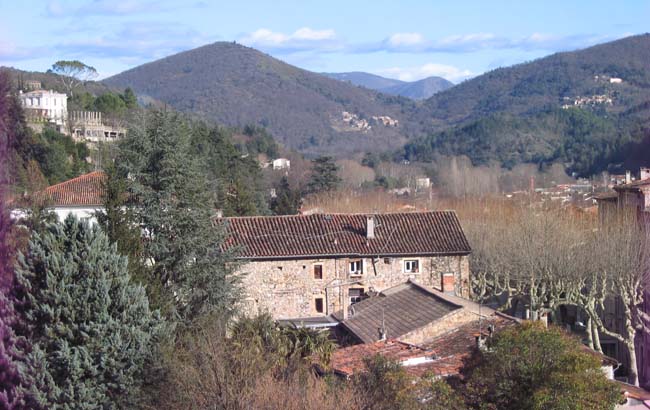Bill Rees recounts his personal experience of encountering the treatment of asylum seekers in the village of Le Vigan, France.
‘Good evening, eight Iraqis, one Afghan and one Eritrean have left Calais and will arrive tomorrow morning around 4-5 hrs at Inter’aide in Le Vigan, next to the Citroën garage opposite the hospital. We are looking for interpreters and translators of Arabic and English, and other people who will help to assure that the refugees will be warmly welcomed before they go off to see their new living quarters.’ (Translated from French*)
So they were coming. There had been several false alerts and reports of asylum seekers coming to Le Vigan but changing their minds last minute. But this text message meant business. It had been sent one evening in late February by an official at the town hall. Evidently some asylum seekers had been persuaded to leave la jungle of Calais and were en route for Le Vigan, a small rural town in Southern France whose population hovers around the 4000 mark.
Months earlier I had volunteered as an English interpreter for Le Vigan’s left leaning mayor who, moved by the plight of migrants, had publicised his intention to help in any way he could. My dubious qualifications as an interpreter were that I spoke passable French and lived in Le Vigan. But the town hall had contacted me and thinking that they must therefore be desperate, I felt obliged to go.
At 4 am outside Inter’aide I met Christine, a Belgian retiree who’d come, she explained, as a representative of Amnesty International. A freshly adhered sticker on her handbag read: Refugees Welcome. While we chatted the premises of Inter’aide opened, and inside Le Vigan’s welcoming committee gradually assembled. They comprised representatives of La Mairie and La Clède, an association to help migrants unravel the complexities of the French administration system. Their principal job was to oversee the migrants’ asylum applications. Madame Stromboli had been summoned since she spoke literary Arabic, and there was also no shortage of well-wishers like Françoise, kindly and bespectacled, who had brought along some dates as a welcome offering. As we gathered around a large table in a classroom of the association, a fancy looking coffee machine was brought in and immediately fired up; caffeine to combat the fatigue of this pre-dawn rendezvous.
We went to meet them as they came off the coach. They were all young men with rucksacks. Sleep starved and travel weary, they hesitantly mustered bonjours as we led them to the classroom whose table was now laden in laden with piles of croissants, pain au chocolate, baguettes and bottles of fruit juice. The food was left untouched as none of the refuges showed the slightest desire to eat anything except for the dates which Françoise had brought.
It was quickly established that they spoke no French and that Madame Stromboli’s rarefied Arabic was beyond their comprehension. All the Iraqis, it transpired, were Kurdish. I was therefore called upon to intervene since the Eritrean and a few of the Iraqis spoke a little English. The Mayor, Eric Doulcier, himself had by now turned up, lending the occasion some formality and wanting to make the young men feel as welcome as possible.
Francis, who works for La Clède, gave each of the men 42 euros, explaining that it was to last them a week. The following week they would receive another 42 euros. One of the men refused the money, explaining that he intended to immediately take to the road and return to Calais. Impressed by such honesty, we persuaded him to take the money and to stay for at least a day, so as to rest. Maybe he would change his mind and decide to stay.
They were taken to the decently equipped council flats in Le Vigan which the town council had made available. There were four; one with four bedrooms, two with two bedrooms and one studio flat.
 An argument developed as one of the Kurds did not want to share a flat with the non-Kurds. But he was presented with little choice as the other Kurds refused to share a flat with him. Perhaps he was mentally unbalanced; a victim of some traumatic event like one of his compatriots, who, having bagsied the one bedroom flat, was visibly distressed, citing an urgent need to see a doctor. He lifted up his shirt to show bruises sustained from a car accident in Iraq. Understandably the youngest of the migrants wanted to share a flat with his elder cousin who had a decent command of English and a demeanour that remained heroically unruffled throughout the flat assignment discussions. After what was a fretful couple of hours, the would be refugees were left in their flats to finally recuperate after their night’s journey from Calais. It had been explained to them that Loic, who also worked for La Clède, had been assigned to deal with their daily needs and concerns. In the following days, both Loic and Francis did their best to allay the men’s fears, issuing them with documents to identify their connection to La Clède, and offering to introduce them to the local gendarmes.
An argument developed as one of the Kurds did not want to share a flat with the non-Kurds. But he was presented with little choice as the other Kurds refused to share a flat with him. Perhaps he was mentally unbalanced; a victim of some traumatic event like one of his compatriots, who, having bagsied the one bedroom flat, was visibly distressed, citing an urgent need to see a doctor. He lifted up his shirt to show bruises sustained from a car accident in Iraq. Understandably the youngest of the migrants wanted to share a flat with his elder cousin who had a decent command of English and a demeanour that remained heroically unruffled throughout the flat assignment discussions. After what was a fretful couple of hours, the would be refugees were left in their flats to finally recuperate after their night’s journey from Calais. It had been explained to them that Loic, who also worked for La Clède, had been assigned to deal with their daily needs and concerns. In the following days, both Loic and Francis did their best to allay the men’s fears, issuing them with documents to identify their connection to La Clède, and offering to introduce them to the local gendarmes.
The rest did them the world of good, for when Francis, Loic and myself called on them in the afternoon, they appeared happy and excited by their new found situations. They had a host of inquiries, which Loic and Francis struggled to answer in one go. The whole process of applying for asylum in France would take time. They seemed happy enough with the arrangements except for two of the Kurds who said they had been expecting to arrive in a much larger town than Le Vigan. They had pictured living in a city, one like Nîmes. When we called on the Kurds assigned the studio flat, oriental music was blasting out of his open window. His mood too was much improved. Mid-way through a massive fry up of beans, tomatoes and eggs, he seemed to have made himself at home.
The following morning I was at Montpellier train station – beginning my trip to Wales – when I bumped into two of the Kurds. From their appearance nobody would have guessed the troubles from which these jean clad young men had fled or of the difficulties awaiting them. They might have been mistaken for students embarking on a holiday with a euro rail pass. They greeted me effusively and explained that it was only on the coach from Calais that they’d learned of their destination. They were now returning to Calais with the hope of being sent to a CAO (Centre d’accueil et d’orientation) in a big city. They said they liked the look of Montpellier.
France (at least its authorities) has been criticised for its treatment of refugees and for not taking in more. The country perceived by many as not caring about the plight of scores of vulnerable people. Much of this criticism may be justified but there is another side of France, which has greatly impressed me.
On behalf of the would be refugees that remained in Le Vigan, I witnessed a conscientious Loic organise health checks with GPs, address their dental concerns, provide free internet sessions at Inter’aid, help procure mobile telephone contracts, collect donated clothes, and enrol each man with organisations like Restos du Coeur, a charity distributing free food packages. He and Francis also took them through the complicated process of applying for asylum, which officially began when their finger prints were taken at Le Préfecture in Montpellier. There they were introduced to the officials of OFPRA (French Office for the Protection of Refugees and Stateless people).
Inside one month, Loic and Francis had had them registered as official asylum applicants, and secured for them free and comprehensive health care. After two months they were receiving 340 euros a month (accessed via a bank card) while continuing to live – rent and bills free – in the council owned flats. La Clède helped them thoroughly prepare for their all-important OFPRA interviews held at Paris. Talking them through likely questions and impressing upon them to emphasise the personal aspects of their stories. They must, Francis insisted, explain to OFPRA why it was so very dangerous for them to return to their country of origin.
Of the eight migrants who had initially remained in Le Vigan, one was separated from the others after a fight, and sent to a CAO in Montpellier. Two others declined to apply for asylum, one returning to Calais, the other expressing a wish to return to Iraq, which La Clède are still trying to organise.
Volunteers (many being middle class women of a certain age) have come forward to help the five remaining candidates for asylum integrate as best they can into the local community. They have been taken on excursions, invited to family meals. They are constantly encouraged to attend their classes to learn French; Françoise being one of their teachers. The Mayor also held a reception in their honour at the town hall.
In June they had to reshuffle so as to vacate one of the flats for the expected arrival of four more refugees. Two weeks ago four Kurdish Iraqis came to and left Le Vigan within the space of half an hour. They had been told they would be going to a COA a couple of hours’ drive south of Paris, not the seven hours that separates the capital from Le Vigan.
Two months ago two Sudanese males (one bearing the scars of a fight at Calais) and two more Iraqi Kurds moved into the flat. They arrived to be welcomed with less ceremony but just as warmly as the first lot of migrants. The Kurds have the advantage of being able to speak to their predecessors but the Sudanese men also seemed to sense that they might be better off in this small town environment.
* Bonjour, huit Irakiens, un Afghan et un Eythrean on pris le depart de Calais et vont arrive demain matin tot ver quatre-cinq heures a local Vigan Inter’aide, cour avant Citreon en face de l’hopital. Recherchons locator et traducteurs de l’arabe et de l’anglais, et toute personne pour assure un accueil chaleureuse avant quills aillent decouvrir leurs lodgement viganais. Merci a tous.












